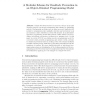Free Online Productivity Tools
i2Speak
i2Symbol
i2OCR
iTex2Img
iWeb2Print
iWeb2Shot
i2Type
iPdf2Split
iPdf2Merge
i2Bopomofo
i2Arabic
i2Style
i2Image
i2PDF
iLatex2Rtf
Sci2ools
115
click to vote
ICFEM
2010
Springer
2010
Springer
A Modular Scheme for Deadlock Prevention in an Object-Oriented Programming Model
Despite the advancements of concurrency theory in the past decades, practical concurrent programming has remained a challenging activity. Fundamental problems such as data races and deadlocks still persist for programmers since available detection and prevention tools are unsound or have otherwise not been well adopted. In an alternative approach, programming models that exclude certain classes of errors by design can address concurrency problems at a language level. In this paper we review SCOOP, an existing race-free programming model for concurrent object-oriented programming, and extend it with a scheme for deadlock prevention based on locking orders. The scheme facilitates modular reasoning about deadlocks by associating annotations with the interfaces of routines. We prove deadlock-freedom of well-formed programs using a rigorous formalization of the locking semantics of the programming model. The scheme has been implemented and we demonstrate its usefulness by applying it to the...
ICFEM 2010 | Practical Concurrent Programming | Programming | Programming Model | Software Engineering |
| Added | 26 Jan 2011 |
| Updated | 26 Jan 2011 |
| Type | Journal |
| Year | 2010 |
| Where | ICFEM |
| Authors | Scott West, Sebastian Nanz, Bertrand Meyer |
Comments (0)

